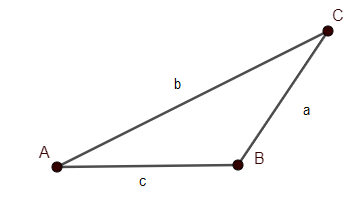Question
Question: In any \(\Delta ABC\), prove that \(a\sin \left( B-C \right)+b\sin \left( C-A \right)+c\sin \left(...
In any ΔABC, prove that
asin(B−C)+bsin(C−A)+csin(A−B)=0
Solution
Hint: Try to simplify the left-hand side of the equation given in the question using the formula of sin(X-Y) followed by the application of the sine rule of a triangle.
Complete step-by-step answer:
Before starting with the solution, let us draw a diagram for better visualisation.

Now starting with the left-hand side of the equation that is given in the question. To start the simplification, we need to use the formula sin(X-Y) = cosYsinX – sinYcosX.
asin(B−C)+bsin(C−A)+csin(A−B)
=a(sinBcosC−cosBsinC)+b(sinCcosA−cosCsinA)+c(sinAcosB−cosAsinB)
Now we know, according to the sine rule of the triangle: sinAa=sinBb=sinCc=k and in other terms, it can be written as:
$\begin{aligned}
& \dfrac{a}{k}=\sin A \\
& \dfrac{b}{k}=\sin B \\
& \dfrac{c}{k}=\sin C \\
\end{aligned}$
So, applying this to our expression, we get
\dfrac{c}{k}\operatorname{cosA}-\dfrac{a}{k}\cos C \right)+c\left( \dfrac{a}{k}\cos B-\dfrac{b}{k}\cos A \right)$$ Now we will take $\dfrac{1}{k}$ common from all the terms. On doing so, we get $$=\dfrac{1}{k}\left( a\left( b\cos C-c\cos B \right)+b\left( c\operatorname{cosA}-a\cos C \right)+c\left( a\cos B-b\cos A \right) \right)$$ To further simplify the expression, we will multiply and open all the brackets. This will give us: $$=\dfrac{1}{k}\left( ab\cos C-ac\cos B+bc\operatorname{cosA}-ab\cos C+ca\cos B-bc\cos A \right)$$ In the above expression we can clearly see that each term is getting cancelled out, giving the final expression to be: $$=\dfrac{1}{k}\times 0$$ Now from the conditions of sine rule, we know that k is not equal to zero, so we can say that $\dfrac{1}{k}$ is finite. We also know that a finite number multiplied by zero gives the product as zero. Therefore, our expression is: $$=\dfrac{1}{k}\times 0=0$$ The left-hand side of the equation given in the question is equal to the right-hand side of the equation which is equal to zero. Hence, we can say that we have proved the equation given in the question. Note: Be careful about the calculation and the signs while opening the brackets. Also, remember that, infinity multiplied by zero can is not always zero; it can be a finite number or infinity as well.